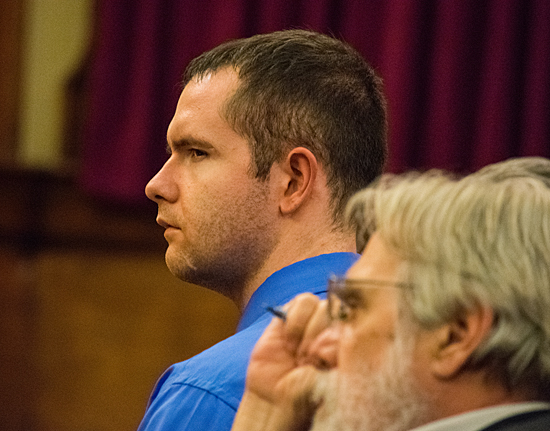Appeals Court upholds Peters conviction
DAVE MOSIER/independent editor
The Ohio Third District Court of Appeals has upheld the conviction of a Delphos man sentenced to life in prison and two 8-year prison terms in the beating death of a 15-month-old boy.

Christopher Peters was convicted on charges of aggravated murder, felonious assault, and endangering children related to the death of Hayden Ivan Ridinger, cited two errors in seeking to have his conviction overturned: that the verdicts were against the manifest weight of the evidence and that the trial court erred in failing to merge the aggravated murder and felonious assault charges for sentencing.
In an opinion written by Judge Stephen R. Shaw, the court looked at both issues cited by Peters’ attorney, Michael J. Short. Van Wert County Assistant Prosecutor Kelly J. Rauch represented the State’s case on appeal.
Judge Shaw noted that Peters contends there was a period of time where Valarie Dean, the boy’s mother, was alone with Hayden and that she could have beaten the boy or administered a lethal dose of
Benadryl to him. Peters also argues that there were no witnesses testifying that he did anything to the boy, that all evidence was circumstantial, and contends the state’s case did not amount to “proof beyond a reasonable doubt” — the legal standard for felony cases.
Shaw noted that, in reviewing whether a defendant’s conviction was against the manifest weight of the evidence, an appellate court acts as a “thirteenth juror” and examines the conflicting testimony. In doing so, the Third District Court reviewed the entire court record, weighed the evidence and all of the reasonable inferences, considered the credibility of witnesses, and determined whether the jury “clearly lost its way and created such a manifest miscarriage of justice that the conviction must be reversed and a new trial ordered.”
Judge Shaw said appellate courts typically reverse a conviction “only in the exceptional case in which the evidence weighs heavily against the conviction.”
The judge also noted that, in overturning the judgment from a jury trial, such as in the Peters case, all three appellate judges hearing the case must unanimously agree.
During his opinion, Judge Shaw outlined the evidence in the case, noting that while there some inconsistencies in the testimony and no one actually saw Peters strike and kill the child, circumstantial evidence in the case placed Peters alone with the boy during the suspected time of death.
“While Peters argues that Valarie was alone with (the boy) once she returned home from work, that time frame does not fit with the time of death, as testified by the State’s witnesses,” Judge Shaw noted.
“Based on the evidence and the testimony presented, we cannot find that Peters’ convictions for aggravated murder, felonious assault, and endangering children, were against the manifest weight of the evidence,” Judge Shaw concluded.
As to the second assignment of error, that the murder and felonious assault charges should have been merged for the purpose of sentencing, Judge Shaw noted that Hayden Ridinger was severely beaten, but could have survived the blows for up to an hour after the beating, noting that Peters’ failure to get medical treatment for the boy led to his eventual death.
“Given the tender age of the child, an initial blow could cause serious physical harm, whereas multiple additional blows to different parts of the body would suggest a separate intent to kill…,” the appellate opinion stated.
Judge Shaw wrote that, based on that statement, the second and final assignment of error was also overruled.
Judges William R. Willamowski and William R. Zimmerman, who also heard the appeal, unanimously agreed with Judge Shaw’s opinion.
POSTED: 05/07/18 at 8:00 am. FILED UNDER: News







